Federal Reserve officials at their recent meeting believed the central bank could remain "patient" in deciding when to adjust interest rates, though some officials thought future rate hikes might still be needed.
In minutes of the April 30-May 1 discussions released Wednesday, Fed officials noted that prospects for the U.S. and global economy had been improving, while inflation had fallen farther below the Fed's 2% target.
Financial markets and President Donald Trump are hoping that the central bank will start cutting rates soon to bolster growth further. The Fed minutes, however, indicated little sentiment for rate cuts.
Instead, the minutes revealed "a few" participants say they thought more rate increases might be needed to keep low unemployment from triggering unwanted inflation.
At its last meeting, the Fed kept its key policy rate unchanged in a range of 2.25% to 2.5%, where it has been since the Fed hiked rates for a fourth time last year.
That December rate boost contributed to a nosedive in financial markets as investors began to worry that the central bank was in danger of over-doing its credit tightening and could send the country into a recession.
Leading the criticism was Trump, who labeled the Fed his "biggest threat" and attacked Fed Chairman Jerome Powell and other Fed officials for not understanding financial markets.
In January, the Fed did an about-face in response to a worsening global outlook and other risks to growth and began signaling they would be "patient" in changing interest rates. While they had projected in December two more rate hikes this year, they now expect to hold steady for the year.
However, Trump has complained that the Fed needs to go further to support the economy by cutting rates and restarting a program to buy bonds to put downward pressure on long-term rates. In contrast, the Fed has been trimming its bond holdings although it has announced these reductions will come to an end later this year.
The minutes did not reveal support for the type of dramatic credit easing suggested by Trump. But there was discussion among Fed officials about the fact that inflation this year has moved further below the Fed's 2% target.
"In light of recent, softer inflation readings, some (Fed officials) viewed the downside risks to inflation as having increased," the minutes said.
But the minutes said that Fed officials still believed a return of inflation to the Fed's 2% target was "the most likely outcome."
At his May 1 press conference, Powell said Fed officials believed the recent slowdown in inflation was likely due to transitory issues, with inflation in coming months resuming its climb toward the Fed's target.
SEOUL, South Korea (AP) — The United States and its allies are discussing options “both inside and outside the U.N. system” to create a new mechanism for monitoring North Korea over its nuclear weapons program, the American ambassador to the United Nations said Wednesday.
Russia last month vetoed a U.N. resolution in a move that effectively abolished monitoring by U.N. experts of Security Council sanctions against North Korea, which prompted Western accusations that Moscow was acting to shield its arms purchases from North Korea to fuel its war in Ukraine.
“I look forward to engaging with both the Republic of Korea and Japan, but like-minded (countries) as well, on trying to develop options both inside the U.N. as well as outside the U.N. The point here is that we cannot allow the work that the panel of experts were doing to lapse,” U.S. Ambassador Linda Thomas-Greenfield told a news conference in Seoul, using the formal name for South Korea.
Thomas-Greenfield didn’t provide specific details about U.S. discussions with allies and other partners, including whether an alternative monitoring regime would more likely be established through the U.N. General Assembly or with an independent entity outside of the U.N.
Thomas-Greenfield met with South Korean Foreign Minister Cho Tae-yul on Monday and they discussed unspecified “next steps to ensure a continuation of independent and accurate reporting” of North Korea’s illicit weapons development activities, according to her office.
Thomas-Greenfield said it was clear that Russia and China, which abstained from voting on the U.N. resolution vetoed by Moscow, will continue to try to block international efforts to maintain monitoring of U.N. sanctions against North Korea. She criticized Russia for violating those sanctions with its alleged arms purchases from North Korea, and China for protecting the North from being held accountable.
Moscow and Beijing have thwarted U.S.-led efforts to tighten U.N. sanctions on North Korea over its ramped-up ballistic missile testing since 2022, underscoring a divide between permanent Security Council members that deepened over Russia’s war on Ukraine.
“I don’t expect that they will cooperate or agree with any efforts that we make to find another path, but that is not going to stop us from finding that path moving forward,” Thomas-Greenfield said.
Thomas-Greenfield also briefly addressed questions about tensions in the Middle East. When asked about the Palestinian Authority's request to have full U.N. membership, she said a U.N resolution in support of that request would not contribute to finding a two-state solution to the Israeli-Palestinian conflict.
“President Biden has said categorically that we support a two-state solution for addressing the situation in the Middle East, where Palestinians will have a state of their own and Israel is secure in their state, and we are working on the ground to get to that place as quickly as possible,” she said.
“We do not see that doing a resolution in the Security Council will necessarily get us to a place where we can find a ... two-state solution moving forward," she added.
Tensions on the Korean Peninsula are at their highest point in years, as North Korean leader Kim Jong Un has accelerated his weapons demonstrations and issued provocative threats of nuclear conflict against rivals.
The United States, South Korea and Japan have responded by expanding their combined military exercises and sharpening their nuclear deterrence strategies built around strategic U.S. assets.
In a telephone conversation on Wednesday, South Korean President Yoon Suk Yeol and Japanese Prime Minister Fumio Kishida agreed to further strengthen three-way cooperation with Washington to counter North Korean threats and other regional challenges amid “deepening uncertainties in the international situation,” Yoon’s office said.
The Security Council imposed sanctions after North Korea’s first nuclear test explosion in 2006 and tightened them over the years in a total of 10 resolutions seeking — so far unsuccessfully — to cut funds and curb its nuclear and missile programs. The last sanctions resolution was adopted by the council in December 2017.
The Security Council established a committee to monitor sanctions, and the mandate for its panel of experts to investigate violations had been renewed for 14 years until last month.
Russia’s U.N. Ambassador Vassily Nebenzia told the Security Council before last month’s vote that Western nations are trying to “strangle” North Korea and that sanctions are losing their “relevance” in preventing the proliferation of nuclear weapons in the North.
In its most recent report circulated last month, the panel of experts said it is investigating 58 suspected North Korean cyberattacks between 2017 and 2023 valued at approximately $3 billion, with the money reportedly being used to help fund its weapons development.
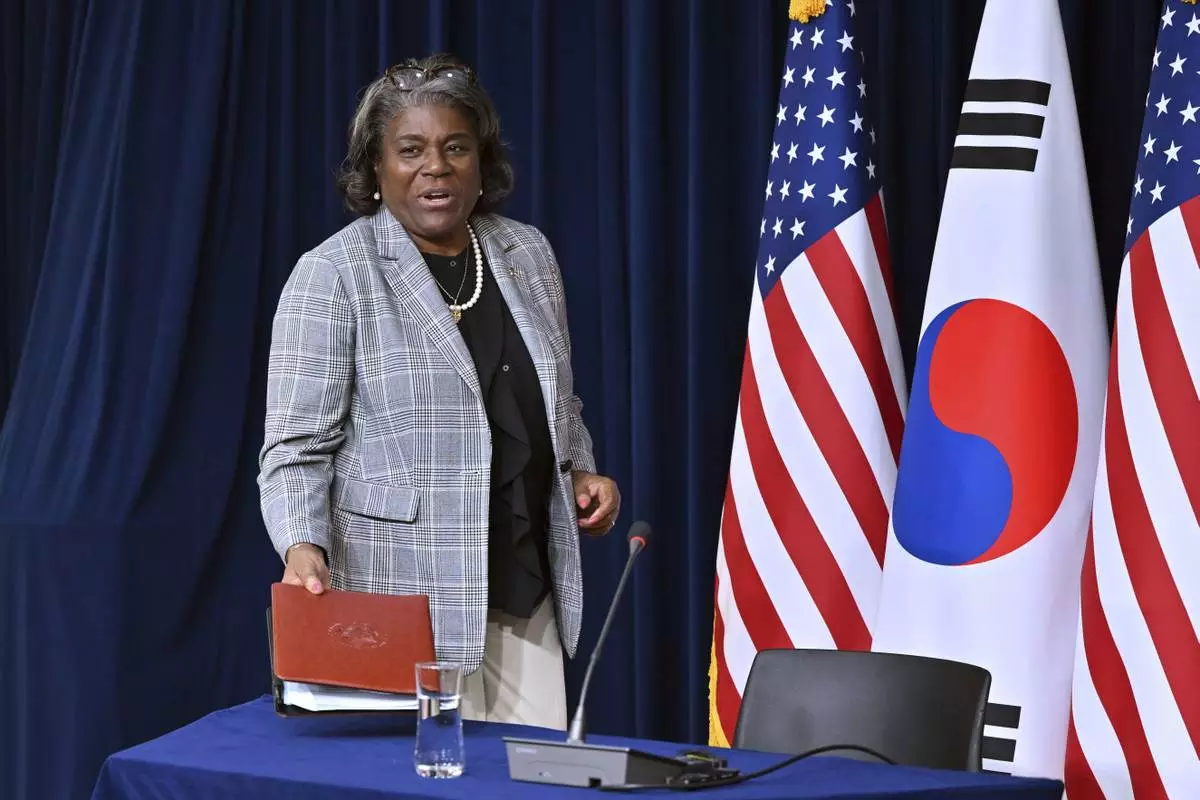
U.S. Ambassador to the United Nations Linda Thomas-Greenfield arrives to attend a press conference at the American Diplomacy House in Seoul Wednesday, April 17, 2024. (Jung Yeon-je/Pool Photo via AP)
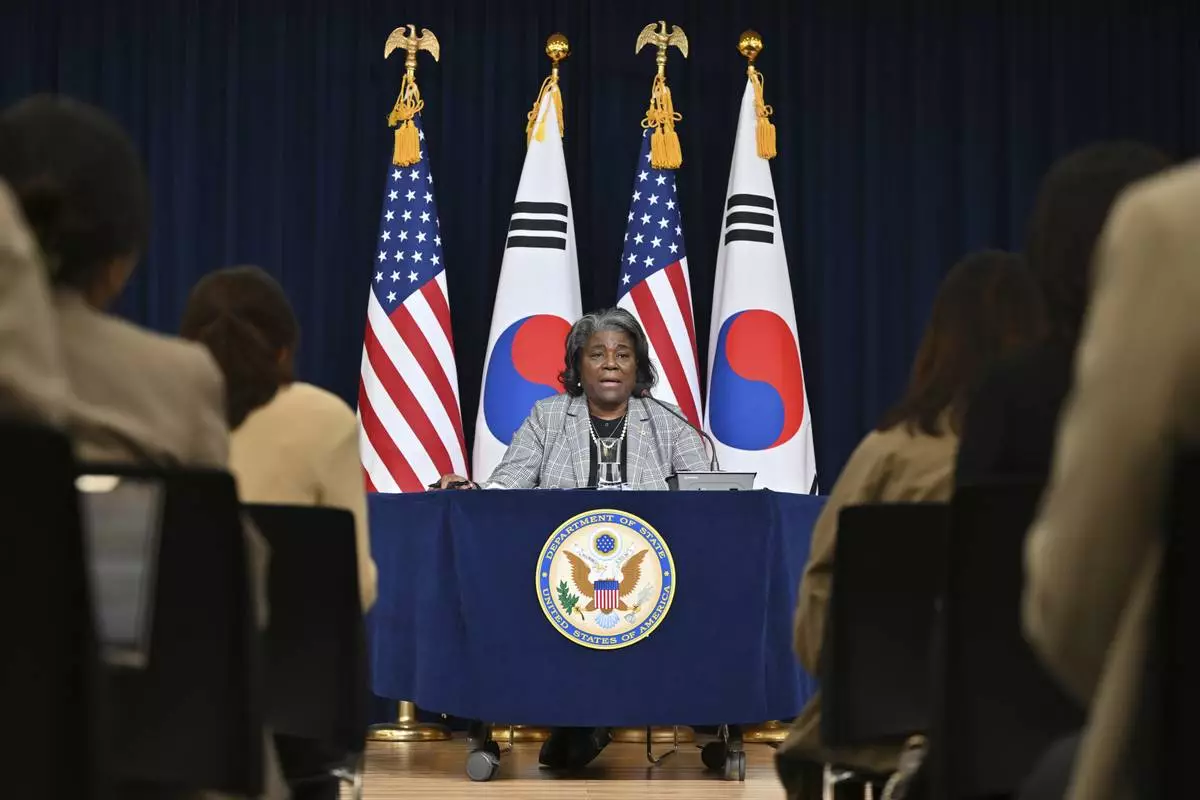
U.S. Ambassador to the United Nations Linda Thomas-Greenfield speaks during a press conference at the American Diplomacy House in Seoul Wednesday, April 17, 2024. (Jung Yeon-je/Pool Photo via AP)
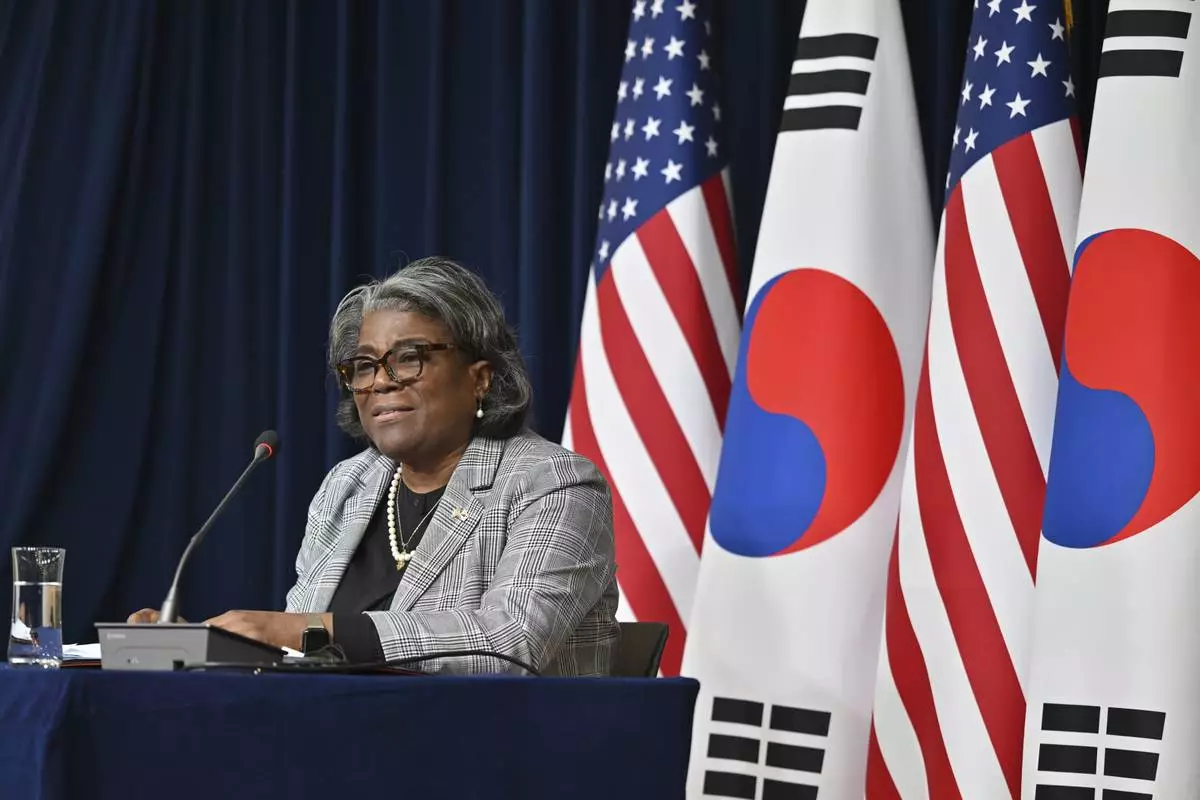
U.S. Ambassador to the United Nations Linda Thomas-Greenfield speaks during a press conference at the American Diplomacy House in Seoul Wednesday, April 17, 2024. (Jung Yeon-je/Pool Photo via AP)
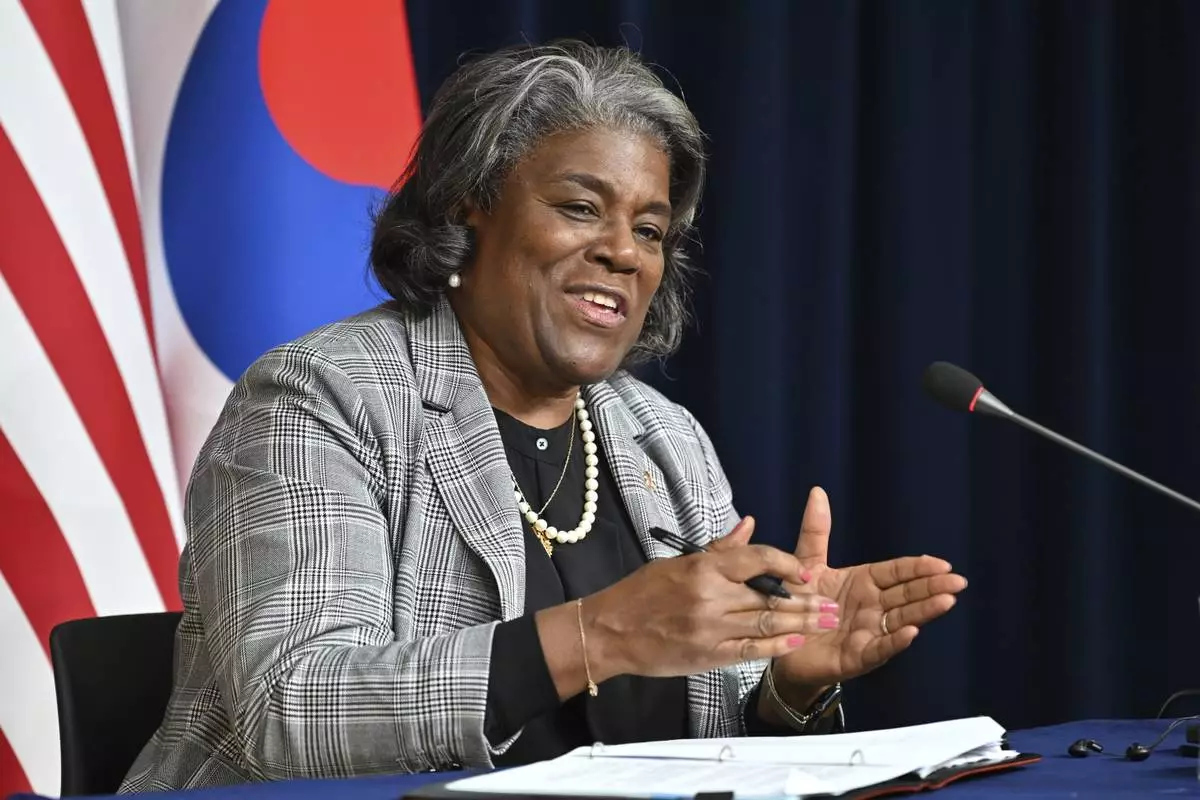
U.S. Ambassador to the United Nations Linda Thomas-Greenfield speaks during a press conference at the American Diplomacy House in Seoul Wednesday, April 17, 2024. (Jung Yeon-je/Pool Photo via AP)
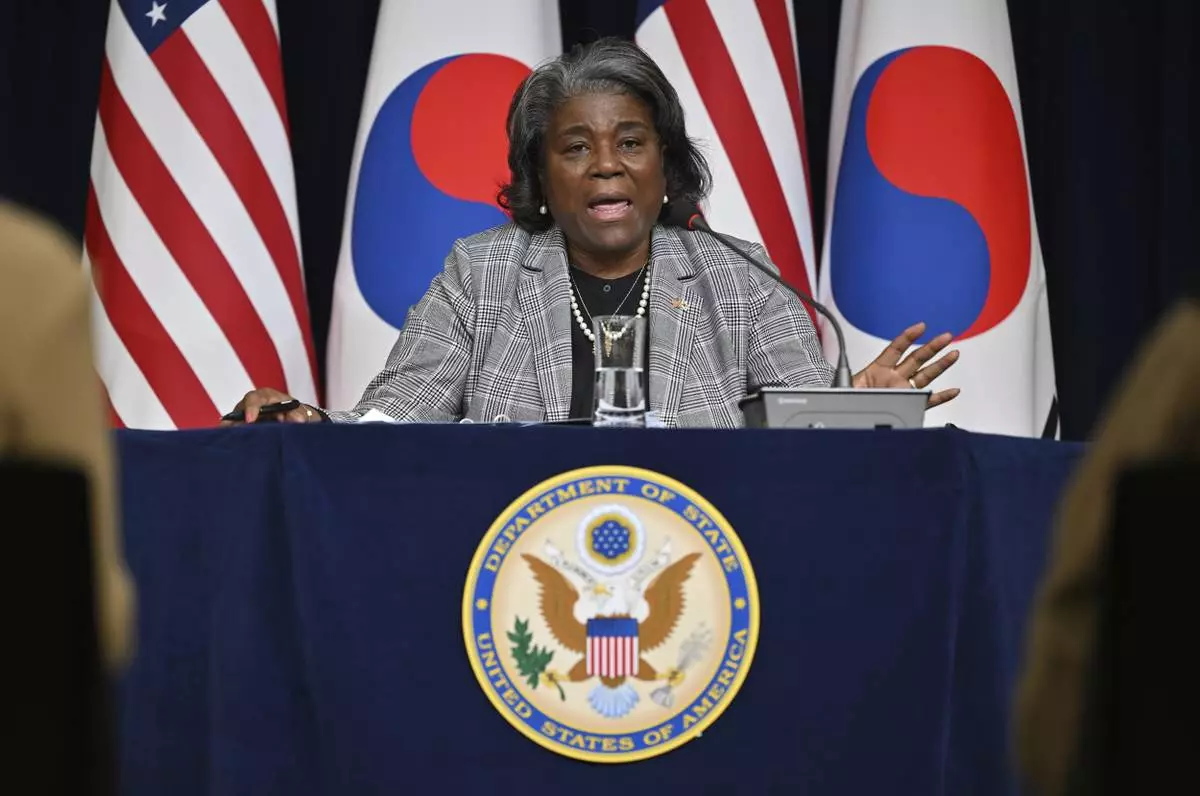
U.S. Ambassador to the United Nations Linda Thomas-Greenfield speaks during a press conference at the American Diplomacy House in Seoul Wednesday, April 17, 2024. (Jung Yeon-je/Pool Photo via AP)
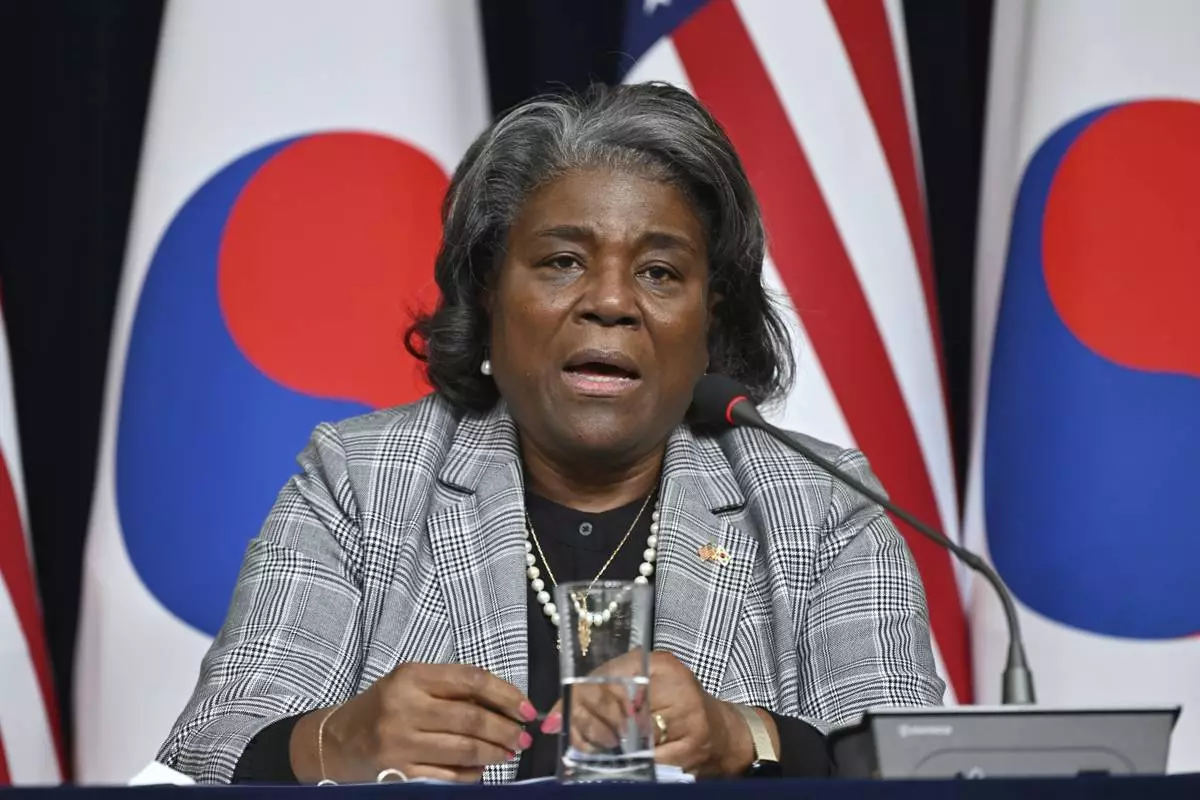
U.S. Ambassador to the United Nations Linda Thomas-Greenfield speaks during a press conference at the American Diplomacy House in Seoul Wednesday, April 17, 2024. (Jung Yeon-je/Pool Photo via AP)















